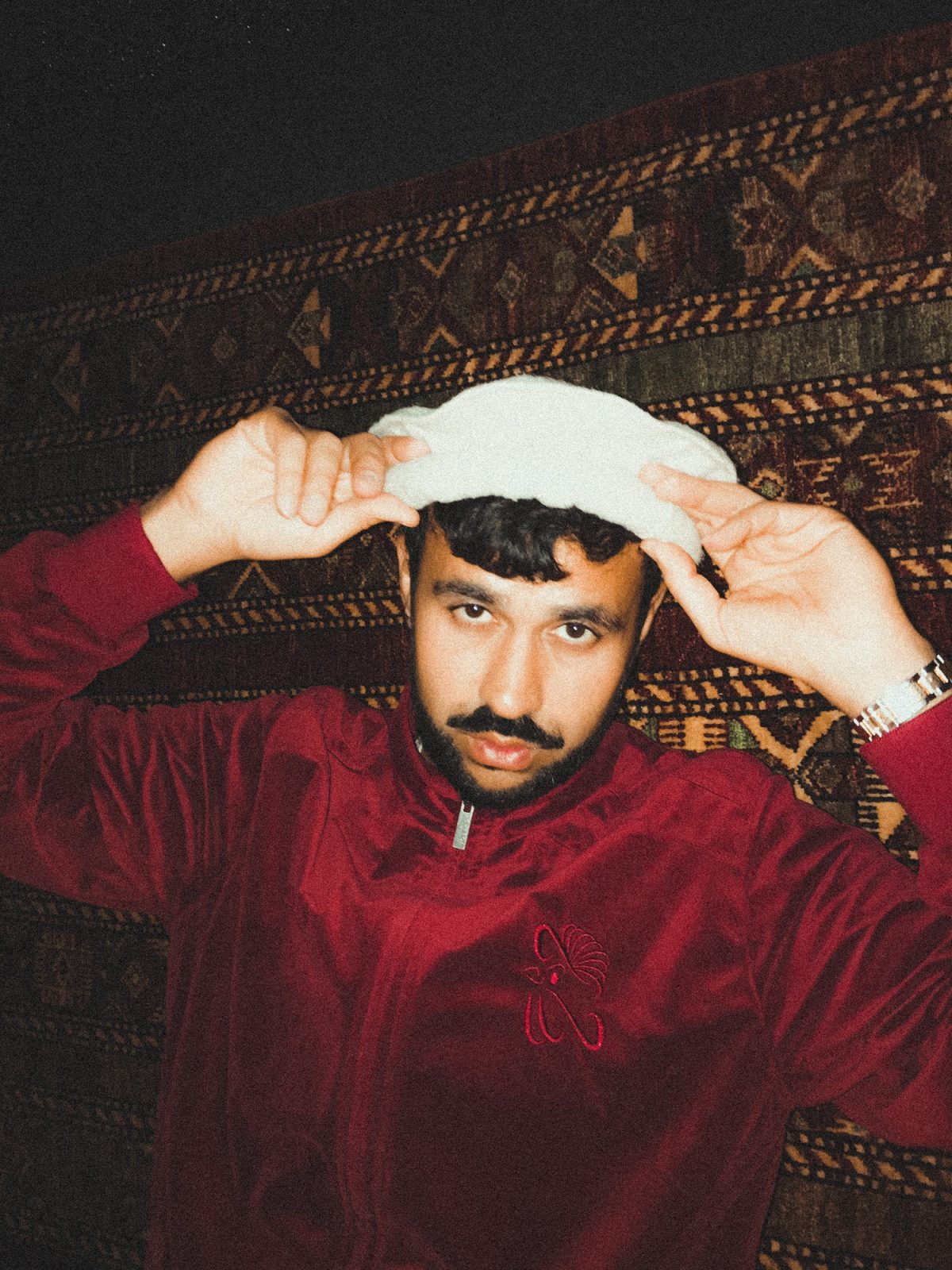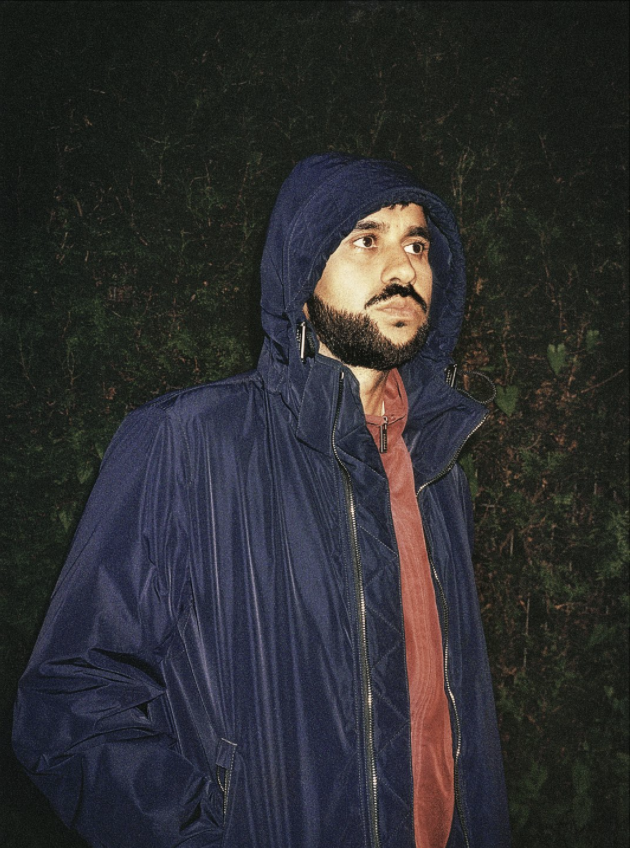It’s 7:30pm in Melbourne when I get on the zoom call with German-based producer Farhot, (born Farhad Samadzada). He appears, reclined in a plush-looking chair, his blue fleece juxtaposing pleasingly against the red felt, and the golden framework giving the illusion of a throne. “I like to hang out here with my little kid when his mother’s exhausted,” he tells me, “we just chill here.”
It’s 9am where he is, and though he was awakened by his son 4 hours ago, he seems bright enough. In fact, the first thing I notice about him is his interesting demeanour. His dark brows hang over his eyes emitting a deep sense of seriousness, yet every now and then a smile peels across his face revealing a gap in his two front teeth. It neutralises the brooding effect, revealing an amicable, even cheeky, side to his character. As we continue to talk, I realise that the interview is proving to be a cat-and-mouse of serious discussion and excitable rapport.
I move forward with my first query: So why seven years?
Suddenly he moves from his plush throne to a chair with a sturdier back, he sits more upright, his hand stroking his chin in thought.
He repeats the question, pausing, “Why seven years?”
Released in 2013, Kabul Fire Vol 1, the predecessor to 2021’s Vol 2, traversed the geography between Farhot’s hometown in Germany and his birthplace in Kabul, Afghanistan. It was a record with a dedicatory standing, honing sounds inspired by his Middle Eastern roots, and built from samples reflecting his expedition across sample-based hip hop. It was a tribute if you will, and as the title suggests, to Kabul.
So what I meant was, why seven years since his last release.
Though the album’s synopsis points to a deep connection to a place of prized personal interest, Farhot displays no hesitation when he tells me that Vol 1 was nowhere close to a passion project, “The album just happened, it wasn’t my idea, it was the idea from Jakarta records. It really felt like a side project to me. I used beats that were available and other artists hadn’t picked by that time, just like 12 beats or something, and that was the album.”
From his blatant honesty I get the impression that Farhot is not Farhad’s first love, the hunch is solidified when he continues on with his explanation, “my passion projects are more experimental, so after Vol 1 I had two alter ego projects coming out. One called Fuchy, and I have Die Achtse. So I haven’t been inactive. I was working on other projects that I was involved in.”
Despite the seven-year hiatus of Farhot and his disinterest in Vol 1 of Kabul Fire, Farhad seems to grow much more excitable when talking about the release of Vol 2, “when it was time for Vol 2 I had to do some homework. I was thinking of the title Kabul Fire, and I thought, ‘I need to make a connection to the country’, I watched films and listened to the music and checked out art from Afghanistan, and what I found was just incredible to me and very inspiring, so I dug deeper.”
From his research, Farhad stumbled upon glowing archives rich with tales of Afghan history. He cites Siddiq Barmaq’s film, Opium War, as his shining star, “I love every second about the film, and I really did not expect such a quality to come out of Afghanistan”, similarly Roya Sadat’s Three Dot’s, “she’s a female filmmaker from Afghanistan, and without her, the second song ‘Kalun’, wouldn’t be possible.”
From folk songs to speeches, most notably from 1980’s Afghan freedom fighter, Ahmad Shah Mousoud on the song ‘Yak Sher’, Farhot managed to skip the litany sometimes associated with beats-based music, and instead weave a colourful tapestry touching on complex personal identity but also Afghan national history. For Farhad this was essential, “It was very much about reconnecting with the country I was born in,” he says.
It’s a country that in the 1980s saw a young Farhad and his family flee, seeking asylum in Germany. However, despite the obvious devastation that comes with relocation saturated in adversity, the following years proved ripe with influence and Farhad bellied his first taste of Western hip hop. LL Cool J’s ‘Mama Said Knock You Out’, a track he describes as ‘very old school’, configured his conceptions of genre, introducing him to the 90’s style beats still seen in his music today. From there the classics like heavy-hitters N.W.A, Wu-Tang Clan and Cypress Hill wormed their way into his musical repertoire.
But what mostly caught his attention were the people behind the music, “when I found out that RZA must be the person behind all the great music that the Wu-Tang Clan did, and DJ Muggs for Cypress Hill, I wanted to be like them, and when I had access to a computer I tried to be.”
For Farhad, hip hop is what ignited his passion for his inevitable career, a distinct outcome of living in Europe. When I ask him further about how both countries, his birthplace of Afghanistan and newfound home of Germany, impacted his music production, he grows quiet, “That question was a little deeper than what I prepared for,” he tells me. Despite this he continues, “Hip hop gave me access to music…so that I discovered from here,” I can see the gears turning in his head, “I think improvising is a big factor. I see a lot of Afghans do that on a daily basis to survive, they improvise, and I love that.”


Much like Farhad’s background, Kabul Fire Vol. 2 represents a mixture of influences mortar-and-pestled into one. Not just from his own Afghani-German roots but from the various locations and backgrounds of his collaborators. It’s a depiction of how his musical method mimics real life. From Tiggs Da Author in Tanzania, to Maverick Sabre in London, to Nneka in Nigeria and Juju Rogers in Berlin, the album offers a patchwork of varying inspirations, breathing a worldly uniqueness into his art.
Yet no track stands firmer off the record than Farhad’s favourite ‘Feel Ugly’, “it’s probably one of my favourite songs that I’ve been involved in in my whole career, which has been 15 years. I think I’ll still love it in 10 years, which I cannot really say about any of the other stuff that I did.” This is the most passionate Farhad’s been throughout the interview, “this is the way I wanna hear soul music,” he says. Stemming from a flurry of improvisation and quickly-whipped up beats, which according to Farhot took a total of 10 minutes, London’s Maverick Sabre, after hearing the backing track from another room began freestyling. “It was done in one take,” says Farhad, “I was lucky that I was fast enough to hand him the microphone.”
Despite the commerciability of Farhad’s firmly labeled favourite, he maintains that most of his music under the guise Farhot is somewhat esoteric, especially in Germany, “It’s very niche so not a lot of people like it. It’s music for people who are very advanced or who are listening to a lot of music and appreciate different types.” That’s when I tell him to come to Melbourne, “the DJ’s here are very exploritave with their music taste, your music could be really popular here.” A surprised look washes over his face, “Okay, I definitely need to connect with Australia.”
This is how we end our conversation, and by the time we say goodbye I feel I’ve gotten a good handle on the producer Farhot, but also his release Kabul Fire Vol 2. Standing somewhere between a want to make Afghani art visible on a global stage, and a desire to dedicate one of his many musical corners to tributing his hometown, Farhad delves into a personal journey fragmented by political turmoil but re-entwined by musical concept. And though perhaps the project Farhot is not his first priority, it seems to be an intimate one.
When I tell him that I watched Siddiq Barmaq’s Opium War as a result of his Album, a smile peels back across his face, again offsetting his mostly resolute character “Ah man, Opium War! I’m very happy you watched that movie,” He shakes his head somewhat disbelieved, but also slightly smug, “This is one of my goals,” he says, “to help make Afghanistan a little bit more seen.
Follow Farhot here for more, and check out Kabul Fire Vol 2 below.
